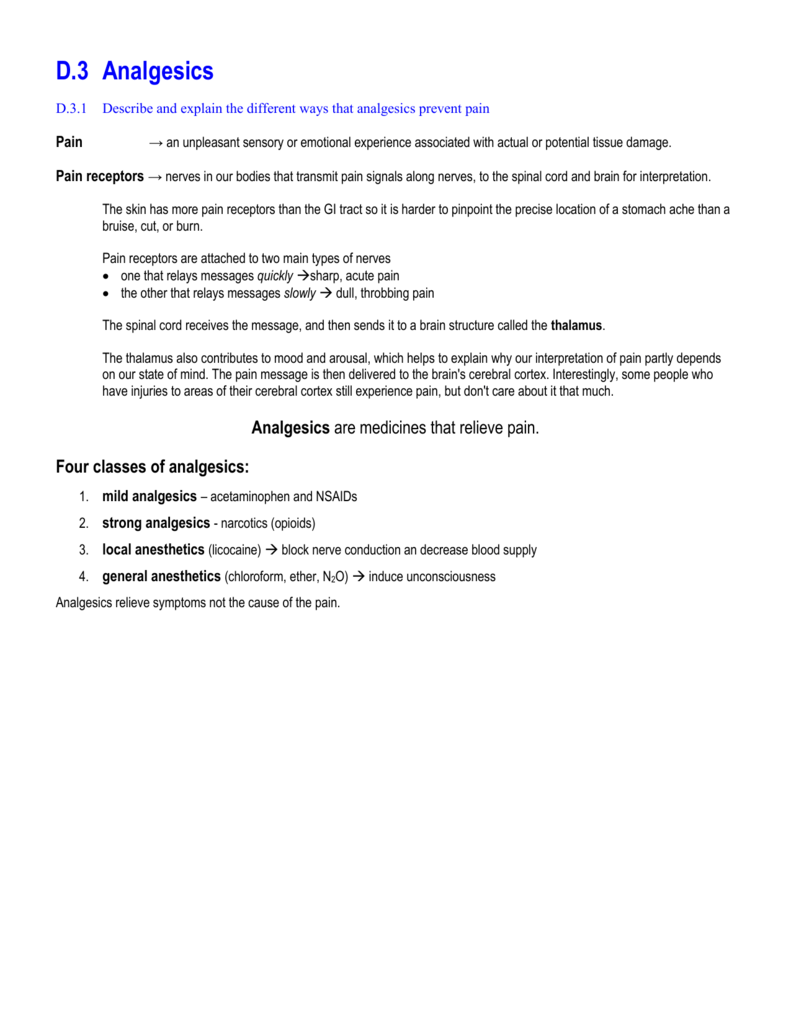Class 1 Narcotics For Pain

SCHEDULE 1 (CLASS I) DRUGS are illegal because they have high abuse potential, no medical use, and severe safety concerns; for example, narcotics such as Heroin, LSD, and cocaine. Marijuana is also included as a Class 1 drug despite it being legal in some states and it being used as a medicinal drug in some states. This class of drugs is available by injection, oral doses, tincture, suppositories and skin patches for particularly sustained release. Usually, the major narcotics are reserved for the treatment of severe pain and/or terminal conditions. When needed in chronic pain, the major narcotics, particularly the sustained release forms, are very helpful.
Dilaudid is the brand name of the drug hydromorphone, which is used to relieve pain. This medicine is in a class of drugs called opiate. It works by changing the way the brain and nervous system respond to pain.

The Food and Drug Administration (FDA) approved hydromorphone in 1984. Dilaudid Warnings Dilaudid can slow or stop your breathing if it is overused, and can lead to complete cessation of breathing (respiratory arrest) and death. You should never take this medicine in larger amounts or for longer than your doctor prescribes. Before taking Dilaudid, tell your doctor if you have ever experienced: • Brain disorders, such as a head injury, seizure, or tumor• Breathing problems, such as,, or (COPD)• Kidney or liver disease• Mood or mental disorders, such as • Stomach or intestinal problems• Difficulty urinating• disease• (inflammation of the ) You should also tell your doctor if you or anyone in your family has a substance-abuse issue, drinks alcohol frequently or regularly, has ever used street drugs, or has ever abused prescription medicines. Taking certain medications with Dilaudid may increase your risk for serious or life-threatening side effects.
Class 6 Drug
You should tell your doctor if you are taking other narcotic pain drugs;;, seizures, mental illness, or nausea; muscle relaxants; sleeping pills; or tranquilizers. The injection form of Dilaudid is available in a regular-strength solution and a concentrated solution that contains more of the drug. Your doctor will prescribe the concentrated solution only if you are opioid tolerant, meaning you have been treated with specific doses of narcotics for at least one week, allowing your body to adjust to the medicine. The concentrated solution may cause serious side effects or even death if it's taken by someone who is not opioid tolerant. Pain medicines work best if they are taken when the symptoms first occur.
This drug may not work as well if you wait until your pain worsens. You shouldn't stop taking this medicine without first talking to your doctor. The drug may cause withdrawal symptoms, especially if it's been used regularly for a long period of time or in high doses. If you use Dilaudid for a long period of time, it may not work as well. Talk to your doctor if you notice the medication stops working for you.
2018 Laws On Narcotic Prescriptions
The 'Dilaudid High' and Abuse Dilaudid has a high potential for abuse. It can be habit-forming, and in some cases, it can cause drug addiction. You should take this medication exactly as your doctor prescribes to lessen the risk of addiction. Also, be sure to store all drugs, especially opiate painkillers, in a safe place where they can't be taken by anyone who doesn't have a prescription for them. Pregnancy and Dilaudid Studies have revealed that Dilaudid may cause harm to an unborn baby. You should tell your doctor if you are pregnant or plan to become pregnant before taking Dilaudid. The medicine can also pass into breast milk and may harm a breastfeeding infant.
You shouldn't breastfeed while taking Dilaudid. Common Side Effects of Dilaudid You should tell your doctor if any of the following side effects are severe or don’t go away: • Nausea or vomiting• • Dry mouth• Dizziness or lightheadedness• Drowsiness• Sweating• Flushing• Itching• Mood changes Serious Side Effects of Dilaudid You should stop taking Dilaudid and call your doctor immediately if you experience any of the following serious side effects: • Slowed or stopped breathing• Rash or hives• Difficulty swallowing• Swelling of the eyes, face, lips, tongue, mouth, or throat• Hoarseness• Seizures• Fainting. You should tell your doctor about all prescription, non-prescription, illegal and recreational drugs; herbal remedies; and any nutritional or dietary supplements you’re taking, especially: • (Buprenex, Butrans, in )• Butorphanol ()• Ipratropium ()• Medications for, irritable bowel disease,, ulcers, and urinary problems• Pentazocine (Talwin)• Isocarboxazid (Marplan)• Phenelzine (Nardil)• Selegiline (Eldepryl, Emsam, Zelapar)• Tranylcypromine (Parnate) Dilaudid and Alcohol Drinking alcohol or using street drugs while taking Dilaudid increases your risk of serious, life-threatening side effects. You should talk to your doctor about these risks. Redgate sql server book. Dilaudid may also make you drowsy. You should exercise caution when driving or operating machinery.